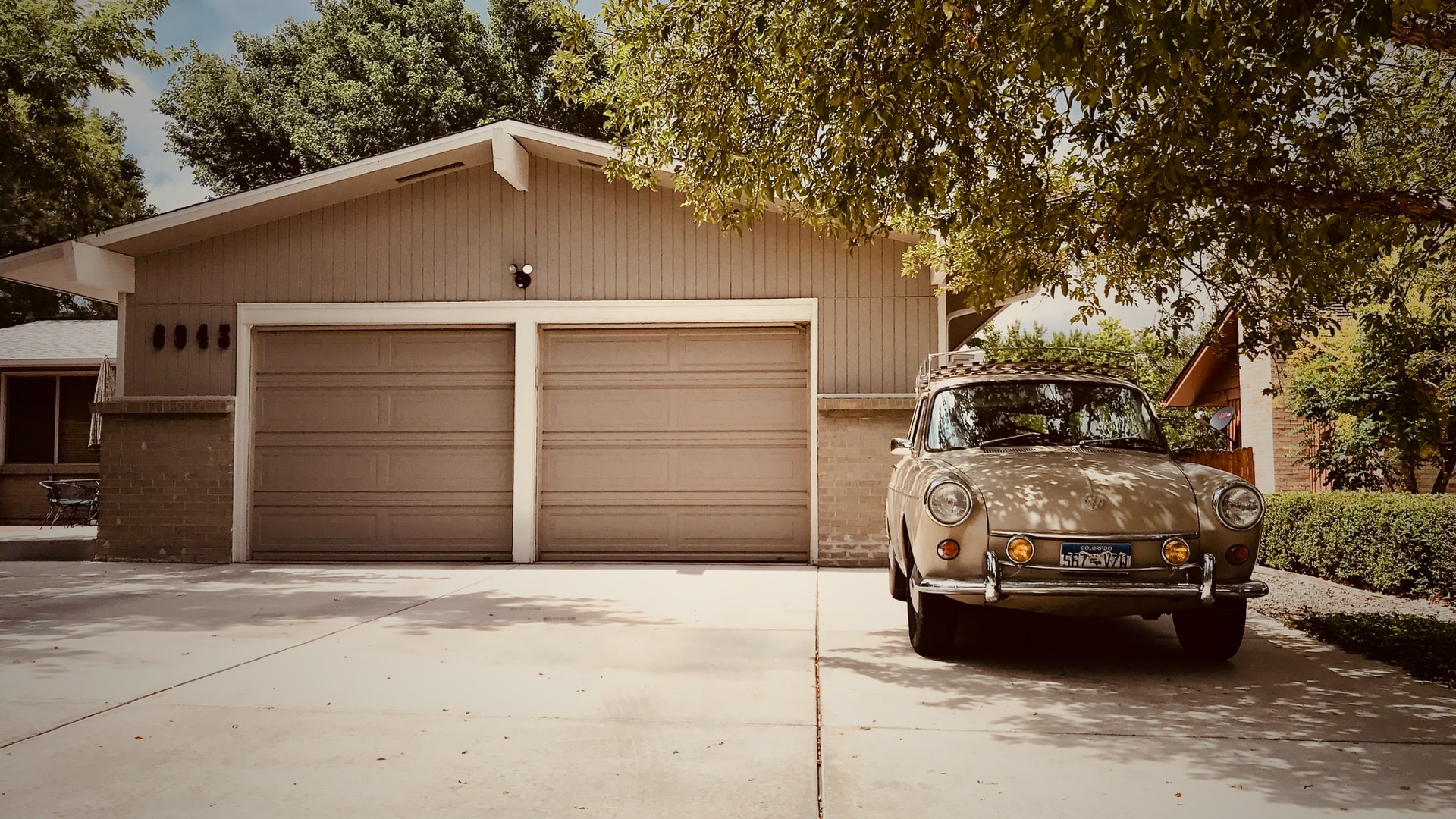A garage offers convenient storage space and vehicle protection. If you don’t have a garage, you’re probably wondering about the cost of building a garage. Unfortunately, there’s no one-size-fits-all answer to this question. Instead, the cost of building a garage varies depending on many factors.
The average cost of erecting a garage is about $27,774, with most projects ranging between $16,747 and $38,926. Homeowners can get as much as 80% return on the investment by erecting a garage. Various high-end and low-end garage designs are available for homeowners with different budgets. This guide covers all the garage-building costs you need to know.
Average Cost to Build a Garage
The type of garage, size, materials used, location, and labor cost affect custom garage construction costs. Here are some of the common factors that affect the final cost of building a garage:
By Size
Like constructing homes, garages are priced per square foot. Most contractors charge $35 to $70 per square foot for a standard garage. A 240-to-380-square-foot single-car garage costs $10,500 to $20,400, and a 440-to-620-square-foot two-car garage costs $20,000 to $40,300.
A 620 to 820-square-foot three-car garage costs $30,000 to $45,000. A 400 to 1,060-square-foot four-car garage costs $32,000 to $73,900. An RV garage needs a 14-by-12-foot door and a 40-foot-deep bay. RV garages cost $36,000 to $140,000 to build.
By Type: In-site vs. Prefab
Depending on your location, a prefab garage may be cheaper than building one on-site. Most subdivisions or HOAs have building regulations, so you should comply before you start. A steel garage kit costs about $4,000 to $6,500. Prefab two-car garage starts at $5,000, compared to $24,200 for an on-site garage. It would help if you also considered foundation pouring costs.
By Material
The cost of labor and construction is highly influenced by the materials you use. Below is a breakdown of some popular building materials and cost factors.
- Cinder block garage: The cost of a cinder block garage ranges from $5,000 to more than $50,000, depending on your location and garage size. This is an ideal material, especially if you live in a location with inclement weather, frequent storms, and hurricanes.
- Brick garage: Erecting a brick garage will cost about $100 per square footage. However, the material is unpopular because it is hard to insulate.
- Brick veneered garage: This is the best option if you want a brick wall appearance but at a fraction of the cost. Brick veneer costs range from $10 to $20 per square footage.
- Stick-built garage: Stick-built garages come with prefabricated roof supports and cost anywhere between $40 and $70 per square footage.
- Metal garage: The cost of metal garages ranges from $6,000 to $22,000. It’s affordable and significantly reduces the build time. However, it may not match the aesthetics of many real estate properties.
Attached vs. Detached Garages
Consider an attached garage if you have extra space and a side door. A detached garage door is best if you don’t have enough space around your house and plan to use noisy equipment.
An attached one-car garage costs around $10,800. Sharing a wall with your house makes installing electricity much cheaper. One-car detached garages cost about $19,300. Depending on materials, size, functionality, and labor, a detached garage can cost $43,000.
Consider driveway and foundation costs when budgeting for a detached garage. The cost of building a driveway is anywhere between $2,900 and $5,500, depending on size and material.
Factors in Estimating the Cost to Build a Garage
Other factors come into play when estimating the overall cost of building a garage. Below are some of the important ones to have in mind:
Number of Garage Doors
Depending on the material, a new garage door costs $600 to $1,767, including installation. You can’t save money on aluminum or vinyl. Fiberglass and steel offer more security, curb appeal, and energy efficiency—a two-door garage costs anywhere from $1,500 to $3,000.
Windows
Consider adding windows or skylights to give natural light throughout the day if you spend a lot of time in your garage. Also, windows can come in handy if you want your new garage to match your home. Composite, steel, wood, and vinyl window frames are popular.
Depending on the design (single, double, and triple-pane windows), a skylight costs $650 to $3,800, and one professionally installed window costs between $380 and $635.
Insulation
Insulation may be necessary if you use your garage for extensive periods or store temperature-sensitive products. Here’s a breakdown of popular insulation materials and their cost per square foot.
- Batt: $0.5 to $1.5
- Blown-in: $1 to $2
- Spray foam: $1.5 to $4
Foundation
Depending on the size, your garage’s foundation will affect project costs. Most garage foundations are made of concrete. If you’re building a small garage on a budget, use gravel. Here are the foundation materials and the per-square-foot costs:
- Gravel pad: $4 to $10
- Floating concrete: $8 to $14
- Monolithic concrete: $9 to $15.50
- Concrete block: $11.50 to $14.50
Roof
Asphalt shingles are popular, durable, and affordable for garage roofing. The cost will depend on the garage’s size, style, and extras like skylights—a garage roof costs around $1,600 to $16,000.
Here are the costs per square foot of different roofing materials:
- Modified bitumen: $1.5 to $5
- Asphalt shingles: $2 to $5
- Cedar: $4 to $10
- Metal: $5 to $20
- Clay: $10 to $20
- Tile: $7.5 to $17
Framing and Entry Door
Consider framing costs if you won’t use metal garage kits or concrete blocks. Most homeowners choose timber frames because they are lightweight, affordable, easy to use, and insulated. In addition, cinder blocks can withstand harsh weather and termites.
Including labor and garage framing costs of $5 to $13 per square foot. Depending on security features, an entry door can cost $100 to $2,500.
Electrical and Wiring
Power tools, an automatic garage door, local building codes, and lighting all require electricity in the garage. Electrical wiring costs $6 to $10 per square foot or $630 to $1,930 for a standard-size garage.
Cost of Labor
Before building a garage, consider local labor costs. Labor costs average $20 to $30 per square foot or 50% to 70% of the total build cost.
Permits
Local building codes require garage inspections upon completion. Your contractor may require a building permit before starting the actual work. Separate permits may be needed for electricity, water, and heat.
Depending on your location, building permits cost between $150 and $1,500, plus HOA fees.
Other Costs to Consider When Building a Garage
When building a garage, it is wise to consider the features that will offer you the accessibility and uniqueness you need. This means an extra cost on your rough project budget.
Garage Door Opener
Manual and automatic garage door openers are available. Automatic garage doors are long-lasting and convenient. Model, brand, garage door style, and power rating affect the price. Installation costs typically range from $220 to $520 but can go as high as $825.
Accessories
Garages are often used as workspaces. Installing fridges, freezers, and all-in-one cabinet systems increases usability. Built-in cabinets cost $3,400, while a workbench costs $375 to $600.
Upgrades
If you spend a lot of time in the garage, you may need to install HVAC, which costs $700 to $1,500. Plumbing costs $600 to $1,600 per fixture if you need running water.
Finishing Costs
It may cost more if you want your garage to match the rest of your property. Drywalling and painting the interior can cost about $1.5 per square foot. Finishing costs depend on whether you want a bare-bones model or a highly customized finish with numerous additional features.
Storage
You can use a car garage as storage to declutter your home. Budget-friendly storage cabinets cost about $55. For more money, you can get a nine-piece garage cabinet system with tool drawers and overhead cabinets, among other features.
How to Finance the Cost of Building a Garage
A new garage can increase your property value and provide some extra living space. However, it can get expensive. These are some of the ways you can finance the total cost of building a garage.
Savings
You can use money from your savings account to finance the garage. This option does not involve any interest payments or late fees. You will also have easy access to your cash instead of having to wait a few days to get approved.
However, tapping into your savings still has its costs. Depleting your savings account for a garage build gives you less cash for other emergency expenses. You may have to take out a personal loan or another financial product if you need to fund a surprise expense. Consumers should assess their specific needs before tapping into their savings.
Personal Loans
These financial products can be a good idea for people who need quick access to cash without using any collateral. Personal loans can help with the higher costs of a 1-car garage or a 2-car garage. You can also get a fixed interest rate for your personal loan, which will keep the monthly payments stable.
Personal loans will hurt your credit score in the short run due to a hard credit check. You will also have to contend with closing costs, and the entire process can take a few days. However, these loans can improve your credit score as you pay them back over time.
Home Improvement Loans
These loans allow you to enhance your property’s value. Advantages include a fixed interest rate, high loan amounts, and the ability to build equity in your home. You get the money you need now to pay for a general contractor and the different materials needed to strengthen the existing structure. However, home improvement loans will give you an additional monthly expense.
Government Loans
The government has several loans available for people who need direct access to additional capital. You will receive your funds, but borrowers have to contend with interest rates and regular monthly payments. One upside is that when you look for government loans, you may also come across grants, which are the least expensive option. You don’t have to pay back grants, but you have to qualify for them. Most people will end up with a government loan rather than a grant.
Credit Cards
Credit cards have rewards programs that reduce the total cost of every purchase. For instance, some credit cards offer unlimited 1.5% cashback, which can be handy. You also have the opportunity to build credit and can borrow against your credit limit at any time. You don’t have to go through a loan application to tap into extra cash.
However, a credit card isn’t the best value proposition if you are funding construction work for a new garage build. Credit cards are notorious for having high interest rates, which can get to 29.99% APR. Furthermore, you will owe additional fees for a cash advance. It’s best to use a credit card for other expenses instead of committing it to a garage build.
However, a credit card can be useful if you can pay off the entire balance by the end of the month. Then, you end up borrowing money without paying any interest or fees. A good rule of thumb is to never spend more on a credit card than you can afford to pay back by the end of the month.
Mortgage Refinance
You can refinance your mortgage to tap into the equity you have built in your home over time. Homeowners build equity with every monthly payment and as their properties appreciate.
While you can use many types of mortgage refinances, you will want to use a cash-out refinance to cover the building costs for your new garage. This refinance replaces your current mortgage with a new one that has a higher balance. If you need $25,000 for your garage build and have a $600,000 mortgage balance, you can refinance to a $625,000 balance. Then, you get the extra $25,000 to cover the garage build.
A mortgage refinance allows you to access your equity and potentially lower your monthly payments. You can turn a 10-year term into a 15-year term to spread your monthly payments across more intervals. However, refinances have extra costs, such as closing costs and prepayment penalties if they apply. Furthermore, a refinance can keep you in debt longer, which leads to more interest accumulation.
Home Equity Loans and HELOCs
Home equity loans and HELOCs let you tap into your home equity without changing the rate and term of your current mortgage. This can be advantageous for people who have secured low interest rates and good terms for their current mortgage. You also get the benefit of having extra cash at competitive rates. Since home equity loans and lines of credit use your property as collateral, they offer lower rates than unsecured financial products like personal loans and credit cards.
However, these financial products will increase your monthly expenses. You will have to contend with a second mortgage. Home equity loans have fixed monthly payments, while HELOCs have variable rates. HELOCs typically start off with lower monthly payments, but you have to repay the balance before the draw period concludes to save money in the long run.
Conclusion: Deciding Which Financing Option is Right for You
Homeowners have several choices with how they raise money for a garage build. This investment will increase your home’s value and can provide extra storage space. You can fit a single car in a garage or multiple vehicles depending on its total square feet.
While some people can pull money from their savings account to cover the entire investment, it’s not for everyone. Using your savings can leave you less prepared for a surprise expense that takes place before you revamp your savings account. Some financing options let you access capital quickly in exchange for higher rates. Other choices take more time but may come with more reasonable interest rates. Loans that use your home as collateral are typically the most affordable options. Lenders set lower interest rates for these loans since you are using your property as collateral.
Regardless of which financing option you use, building your credit will result in big savings. You’ll get a lower interest rate and can qualify for a higher loan amount. Improving your credit score can also assist with future loans. A garage build is a noteworthy and worthwhile investment. Just make sure you get the right financing that leaves enough room in your budget for your own needs.
FAQs About Cost to Build a Garage
You can look at previous builds in your area to see the average cost per square foot. If a local builder usually charges $50 per square foot, and you want to build a 400-square-foot garage, it will cost approximately $20,000.
The costs of building a garage vary for each project. Some factors to consider are whether you want an attached or detached garage, if you want extra storage space, and if you want plumbing and electrical included in your garage.







